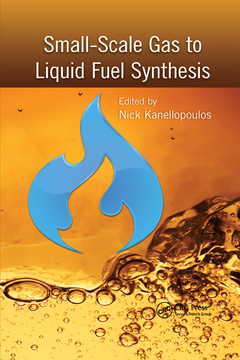Small-Scale Gas to Liquid Fuel Synthesis
Coordonnateur : Kanellopoulos Nick

It is estimated that a large fraction of natural gas reserves are found in locations from where transport is not economical. If these isolated natural gas reserves could be converted to synthetic fuels, they would generate around 250 billion barrels of synthetic oil?a quantity equal to one-third of the Middle East?s proven oil reserves.
Small-Scale Gas to Liquid Fuel Synthesis explores next-generation technologies geared toward overcoming the significant cost and technical barriers prohibiting the extensive use of conventional gas to liquid (GTL) processes for the exploitation of small and/or isolated natural gas reservoirs. The book highlights key research activities in the framework of two large European projects?Innovative Catalytic Technologies & Materials for Next Gas to Liquid Processes (NEXT-GTL) and Oxidative Coupling of Methane followed by Oligomerization to Liquids (OCMOL)?examining novel technical developments that reduce the costs associated with air fractioning and syngas production.
Featuring contributions from internationally respected experts, Small-Scale Gas to Liquid Fuel Synthesis discusses innovative GTL technologies based on recent advances in catalytic membrane systems, reaction engineering, and process design. The book provides academic and industrial researchers with a concise presentation of the current state of the art of low-cost, energy-efficient GTL technologies for small-scale applications.
Integration of Innovative Membranes and Sorbents with the GTL Process. Status of and Challenges in Converting Natural Gas. Oxygen Transporting Membranes in Syngas Production. Recent Developments in Membrane Technologies for CO2 Separation. H2 and Olefin/Paraffin Separation with Porous Materials: State of the Art and New Developments. Separation of Ethylene/Ethane Mixtures with Silver Zeolites. Selective Removal of CH4 from CH4/CO/H2 Mixtures. Integration of Innovative Catalysts with the GTL Process. Combining Catalyst Formulation and Microkinetic Methodologies in the Detailed Understanding and Optimization of Methane Oxidative Coupling. New Trends in Catalyst Design for Methane Dehydroaromatization. Structured Catalysts on Metal Supports for Light Alkane Conversion. Methane Dry Reforming on Nanocomposite Catalysts: Design, Kinetics, and Mechanism. Development of Bifunctional Ni-Based Catalysts for the Heterogeneous Oligomerization of Ethylene to Liquids. Understanding the Mechanisms of Gas-to-Liquid Processes with the Aid of Quantum Chemistry Tools: Case Studies of the Shilov Reaction and Natural Gas Aromatization. Innovative Oxidative and Nonoxidative GTL Processes. Production of High-Octane Fuel Components by Dehydroalkylation of Benzene with Mixtures of Ethane and Propane. Syngas to Liquids via Oxygenates. Solar-Aided Syngas Production via Two-Step, Redox-Pair-Based Thermochemical Cycles. Membrane-Assisted CPO: A New Sustainable Syngas Process. Methane Direct Aromatization Process from an Industrial Perspective: Technical Catalyst and Conceptual Design for Reactor and Process.
Dr. Nick Kanellopoulos is the research director of the Membranes for Environmental Separations Laboratory, the president of the National Center for Scientific Research "Demokritos", the chairman of the Committee of the Presidents of the Greek Research Centers, the author or coauthor of more than 170 publications in peer-reviewed journals, the editor of 5 books in the field of nanoporous membrane applications, the recipient of a total funding of €12 million from more than 50 European and national programs, and a participant in 2 high-tech companies in the field of nanoporous materials. He was previously the coordinator of the European Network of Excellence in nanotechnology in-situ study and development of processes involving nanoporous solids (inside-pores.gr) and of the committee for the preparation and submission of the proposal for a Greek National Nanotechnology program. In addition, he has been a Fulbright scholar, the president of the Greek Fulbright Scholars Association, and a member of the National Representation Committee of Greece for the FP6-NMP and FP7-NMP European programs in nanotechnology, as well as the National Committee for Nanotechnology in Brussels.
Date de parution : 12-2020
15.6x23.4 cm
Date de parution : 02-2015
15.6x23.4 cm
Thèmes de Small-Scale Gas to Liquid Fuel Synthesis :
Mots-clés :
C2 C4 Alkane; MTO; Integration of Innovative Membranes with the GTL Process; IL Phase; Integration of Innovative Catalysts and Reaction Engineering with the GTL Process; Zeolite Membranes; Rational Design of Methane Oxidative Coupling Catalysts; Nanocomposite Catalysts; Innovative Oxidative and Non-Oxidative GTL Processes; Allowing the Exploitation of Small Natural Gas Reservoirs; SEM Picture; Direct; Low-Temperature; Non-Oxidative; NG Conversion to Alkylaromatics; GTL Process; Membranes; SEM; Chemicals; Membrane Reactor; Catalyst; Synthesis Gas; Liquid; CH4 Conversion; Natural Gas; GTL; Steam Reforming; Methane Conversion; Bet Area; Syngas Production; ZSM-5 Catalysts; Catalytic Partial Oxidation; 27Al Ma NMR Spectrum; Ni Loading; Methanol Conversion; NH CH; Dry Reforming; Oxygen Permeation; Solar Energy



